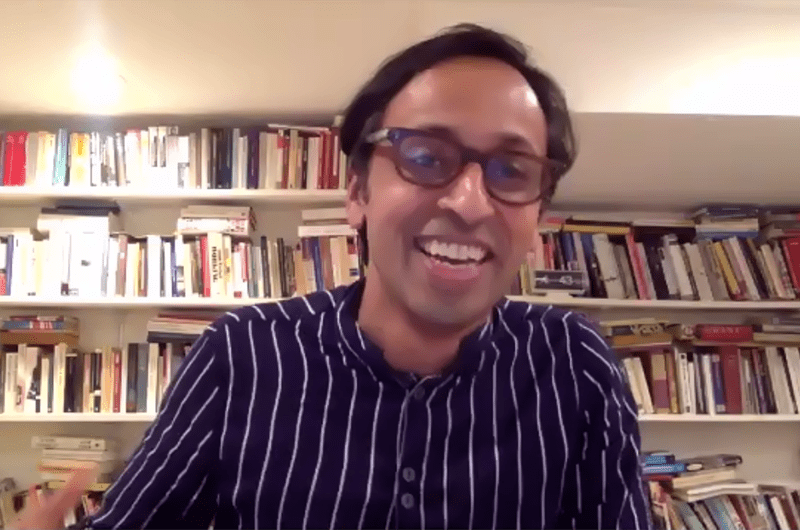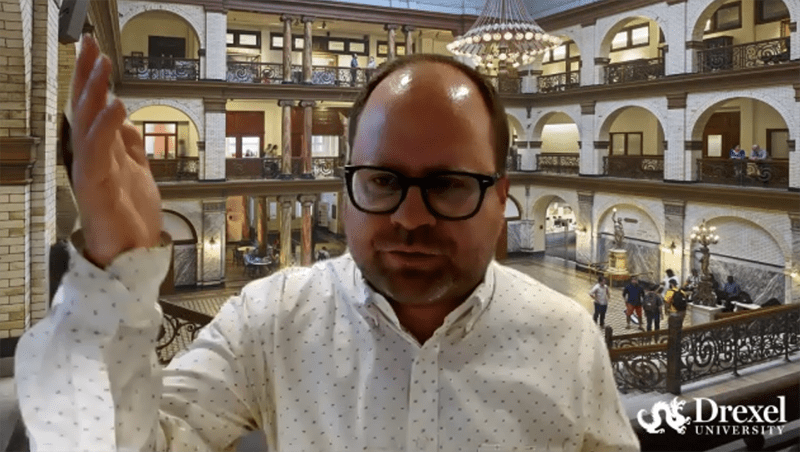5 Takeaways From Pennsylvania State Senator Nikil Saval’s Virtual Visit to Drexel

By Beth Ann Downey and Thomas Knoetgen
On May 4, Pennsylvania State Senator Nikil Saval joined Andrew Zitcer, PhD, program director for Drexel University’s graduate program in urban strategy, in discussion for an ongoing event series, “Urban Strategy in the Present Tense,” sponsored by the Lindy Institute of Urban Innovation. This virtual Q&A-style event covered Saval’s career path from his time as an author and editor to his successful run for his current senate seat.
The series tackles social, political, environmental and economic problems in an ever-expanding and dynamic world with some of the most profound and informative speakers, and dovetails with the Lindy Institute’s mission to promote urban innovation and leadership.
Here are five things Saval shared with Dragons to keep in mind during their own career, leadership and civic-engagement journeys:
1. Just because you don’t strive to fill a leadership position doesn’t mean you can’t one day hold one.
Before Saval ever dreamed of becoming an elected official, he was a co-founder and organizer for Reclaim Philadelphia, a political organization that promotes mobilizing and community-building, in the city, as well as an expansive list of left-wing ideals, from the abolition of racism to clean energy. Through his work with Reclaim, Saval saw important political victories, like that of Philadelphia’s current district attorney, Larry Krasner, whom the organization had canvassed in support of when he was first elected in 2017.
Another inspiring victory that hit closer to home was seeing his friend, Elizabeth Fiedler, a journalist for NPR, run and win in 2019 for state representative in South Philadelphia. With the bonds that he created through Reclaim and the support from his own South Philadelphia community, the thought of Saval himself running for his own elected office started coming up amongst his peers, and the idea also started not to seem so far-fetched.
“I knew that if I ran, it wouldn't be because I had something special about me or because I had any particular talents or what have you, but that we had built up credibility and power through this enormous base of volunteers. That would not only be the way we would win, but that would be the backbone. That would be the spine that we had in order to pursue the policies that we had all fought for at various levels,” he said.
2. Active writing can help shape your field of study.
Prior to running for office, Saval always knew he wanted to be a writer and pursued this dream during undergrad at Colombia University in New York City. As a writer and editor for the literary and social commentary magazine n+1, Saval became enveloped by the stories of the city and the society he saw around him. From his first piece, an opera review, to his commentary on the catastrophe of Hurricane Katrina in New Orleans, Saval was able to hone his voice and shape his interests. With his essay on the Atlantic Yards, a contentious urban development project in Brooklyn, Saval explained the influences and intricacies that made cities across the nation tick.
“All of these were just attempts to explain to myself what cities were and how power and wealth, organized those cities, and to what extent social movements could fight back against them or be co-opted into them,” he said.
3. Sometimes, a loss can divert your energy in a better direction.
When Saval landed his first job in book publishing, he was shocked by the merciless firings and layoffs he witnessed in what he thought to be an “idyllic” industry. Stunned at how commonplace these commercialized practices had become, Saval was determined to form a union in his workplace. Despite his efforts, as his first experience in an organizational position, Saval’s inexperience in how to form such a union led to it barely ever getting off the ground. However, his failure laid the groundwork for his 2014 book “Cubed: A Secret History of the Workplace” as well as his volunteer work with Unite Here, a hospitality workers union.
“I really had no idea what to do or what I was doing. But that feeling of not knowing how to do it or not having models [led me to] want to understand why this consciousness or understanding was not really widely available in white-collar workplaces in my experience,” he said.
4. Volunteer work can help introduce new perspectives that couldn’t have been seen otherwise.
Soon after starting with Unite Here while he was a graduate student at Stanford University, Saval became a boycott organizer, and helped coerce companies away from using hotels that were on strike. In the role, he found himself confronting people who, like him, didn’t necessarily understand the union movement or how to best support workers’ rights. However, the position gave Saval a real-world sense of how these organizational movements worked and built success. When he moved to Philadelphia in 2011, Saval continued to work with Unite Here, where the organization supports workers in stadiums, the airport, and even the School District of Philadelphia.
“This was liberating for me, in part because of that spirit of confrontation, and also because I was volunteering with the union that was largely Black and brown immigrants that had enormous power in a very expensive city. … You don't always win. But just seeing people win power and being a part of that was very transformative for me. Especially low-income, working-class, Black and brown people, immigrants, etc. — people who are not supposed to have that power, or not often afforded it,” he said.
5. Politicians and leaders are nothing without the constituents they serve.

Since taking office last year, Saval has pushed forward in this spirit of confrontation to move the needle on issues important to his office and his constituents, including criminal justice reform, social housing and the Green New Deal. At the event, Zitcer pointed out that Saval’s stance is to bring his constituents into the fold in a way that is “almost like an inversion of lobbying.” Saval said he liked this description, and that this is an important approach for him as a “movement elected official.”
“You want to move people, and you yourself are also moved in turn. That’s how progress happens, and every official who is taking their cues from social movements has fought for things that seem to be slightly ahead of their time. That's not because they are ahead of their time. It's just because there are movements that have come up with those ideas and are pushing for them and can kind of see one step ahead. No elected official could do that, you need the movements themselves to do that work,” he said.
In This Article
Drexel News is produced by
University Marketing and Communications.
